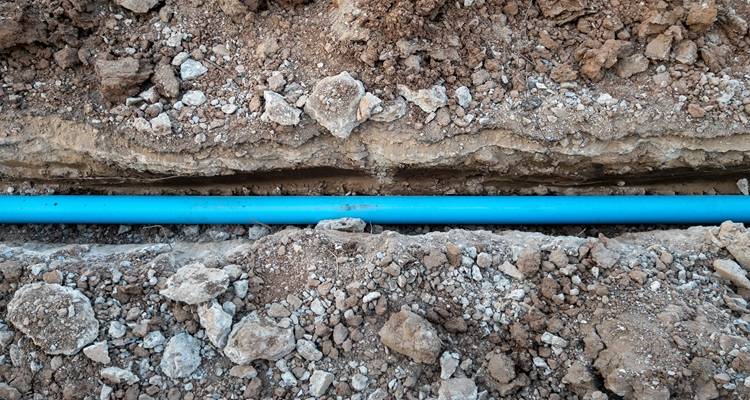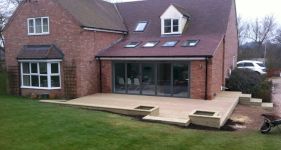House Extension Cost
- The average house extension costs around £40,000.
- Extending a property usually takes between 10 to 18 weeks to complete.
- How much various types of house extensions cost per m² in 2025, as well as what impacts extension prices you're quoted by builders.
- What's involved in building a house extension and details about planning permission and building regulations.
- Expert advice from tradespeople on MyJobQuote.
- How to find and hire a local builder in the UK.
Trying to find out how much a house extension costs?
In this guide, we breakdown extension prices for all the different types, including rear, lean-to, side, side return, wraparound, porches, garages and even conservatories.
To give you an idea, the average extension cost is typically anywhere around £40,000.
Whether you're after a single or double storey extension, finding out how much it will cost has never been easier.
By providing the cost of an extension per square metre, we've made it simple for any homeowner to calculate how much their extension will cost them.
Ready to get a house extension quote?
Submit a few basic details and find builders near you. They'll provide you with quick, easy, free, and no obligation house extension quotes.
Want to learn more first?
Continue reading below to find out everything you need to know about the cost of an extension in 2025!
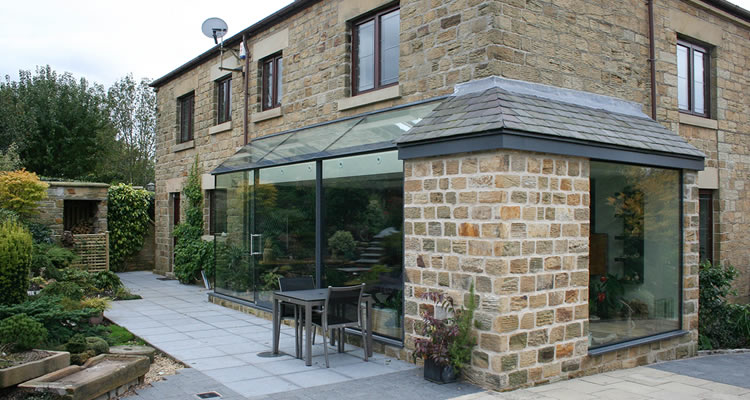
£40,000
Table of Contents
- How Much Does an Extension Cost in the UK?
- House Extension Prices
- What Is the Cost of Building an Extension? (Labour Only)
- What Is the Cost of Extension Materials? (Supply Only)
- Additional House Extension Costs
- What Impacts House Extension Costs?
- What's Involved in Building a House Extension?
- Can I Build a House Extension Myself?
- Types of House Extension
- Building Regulations and Planning Permission for a House Extension
- What Are the Benefits of a House Extension?
- Where Can I Put a House Extension?
- Alternatives to a House Extension
- Cost of House Extension Removal
- Checklist: Hiring House Extension Builders in the UK
- FAQs
- Sources
How Much Does an Extension Cost in the UK?
When it comes to building an extension, the final cost will depend on a wide range of choices you make. The most important of those choices is the size and type of extension you choose to build, followed by the level of finish you want.
For a basic finish, with just the bare essentials built, you are looking at house extension costs of £900 to £1.700 per m². To upgrade to a high-quality finish, with top range and bespoke choices throughout, the cost will be around £1,750 to £2,200 per m².
You can lower your cost per meter square by building over more floors. The more floors you build, the cheaper the extra space is per m². This is because a large percentage of the costs go towards building the foundations for the new space.
The average cost of an extension is around £40,000.
In general, is it better to consult with a local authority building inspector or an independent one when you're designing and building a big house extension?
House Extension Prices
The major cost factors that will affect the price of your house extension are the type of extension you choose, how big the extension will be, and the quality of the finish.
Compare Extension Costs by Type
The type of extension you chose will come with different costs to construct. To allow you to make a comparison, the following table shows house extension costs per m² for different types of extension assuming a good quality finish throughout.
| Type of Extension | Cost per m² |
|---|---|
| Single Storey | £1,700 – £1,900 |
| Double Storey | £1,500 – £1,800 |
| Double + Loft | £1,300 – £1,750 |
Compare Extension Costs by Finish Quality
The quality of the finish will have a large impact on the final price per square meter of your home.
| Quality of finish | Cost per m² for Single Storey | Cost per m² for Double Storey | Cost per m² for Double Storey + Loft |
|---|---|---|---|
| Basic | £1,000 – £1,700 | £950 – £1,500 | £900 – £1,300 |
| Good | £1,700 – £1,900 | £1,500 – £1,850 | £1,300 – £1,750 |
| High | £1,900 – £2,200 | £1,850 – £2,200 | £1,750 – £2,200 |
What Is the Cost of Building an Extension? (Labour Only)
The total costs for labour will vary a great deal depending on the exact nature of the work that you have completed. The following is a rough idea of costs and timescale.
Average Extension Labour Costs and Timeframes
| Type of Extension | Duration | Average Labour Costs |
|---|---|---|
| Lean-to | 11 – 13 weeks | £25,000 – £40,000 |
| Side Return | 9 – 12 weeks | £15,000 – £25,000 |
| Wrap Around | 10 – 14 weeks | £40,000 – £100,000 |
| Kitchen | 10 – 14 weeks | £25,000 – £100,000 |
| Double Storey Lean-to | 16 – 18 weeks | £40,000 – £60,000 |
| Double Storey Wrap Around | 17 – 19 weeks | £50,000 – £150,000 |
Hourly Rates for Different Types of Tradespeople
| Tradesman | Average Cost Per Hour |
|---|---|
| Builder | £20 – £35 |
| Tiler | £20 – £40 |
| Plumber | £35 – £45 |
| Electrician | £50 – £120 |
| Plasterer | £30 – £50 |
| Decorator | £20 – £50 |
| Joiner | £35 – £45 |
| Roofer | £30 – £40 |
| Kitchen Fitter | £20 – £30 |
What Is the Cost of Extension Materials? (Supply Only)
In most cases, it's best to let your tradespeople source the majority of the materials for a project like an extension. If there are any problems and items that need to be returned, it is much easier for a tradesperson to do so than for a member of the public.
However, to help you get a feel for the costs involved, below are the costs of the materials you would need to fit out your extension once it is built.
Flooring Costs
| Type | Average Cost Per M² |
|---|---|
| Vinyl | £7 – £20 |
| Wood | £17 – £70 |
| Carpet | £4 – £40 |
| Tile | £10 – £60 |
Heating Costs
| Type of Heating | Average Cost |
|---|---|
| Traditional radiator | £60 – £150 |
| Electric Radiator | £150 – £300 |
| Underfloor Heating | £100 – £150 per m² |
Window Costs
| Type | Size (cm) | Average Cost |
|---|---|---|
| Velux | 98 x 78 | £325 – £375 |
| 140 x 78 | £400 – £450 | |
| 180 x 78 | £500 – £550 | |
| uPVC | 60 x 90 | £250 – £400 |
| 90 x 120 | £400 – £600 | |
| 120 x 120 | £650 – £900 |
Door Costs
| Type | Average Cost |
|---|---|
| Internal | £50 – £200 |
| External | £300 – £500 |
| Patio | £300 – £1,000 |
Kitchen Costs
| Item | Average Cost |
|---|---|
| Units with Doors and Handles | £3,200 – £5,500 |
| Worksurface | £200 – £2,000 |
| Appliances | £1,500 – £5,000 |
Bathroom Costs
| Fixture | Average Cost |
|---|---|
| Bath | £80 – £500 |
| Shower | £60 – £1,000 |
| Show enclosure | £100 – £550 |
| Toilet | £50 – £500 |
| Sink | £50 – £300 |
| Taps | £50 – £100 |
Tile Costs
| Material | Cost per m² |
|---|---|
| Ceramic | £12 – £50 |
| Glass | £110 – £160 |
| Granite | £80 – £90 |
| Limestone | £50 – £80 |
| Marble | £40 – £70 |
| Porcelain | £50 – £100 |
| Quarry | £20 – £30 |
| Quartzite | £70 – £100 |
| Quartz and Resin | £80 – £90 |
| Slate | £40 – £50 |
| Terracotta | £50 – £60 |
Lighting Costs
| Type of Lighting | Average Cost |
|---|---|
| Pendant/chandelier | £40 – £100 |
| Simple ceiling or wall lamp | £40 – £60 |
| Recessed Spotlights | £80 – £110 |
| Dimmable ceiling or wall lights | £80 – £100 |
Kitchen Appliances
| Item | Average Cost |
|---|---|
| Fridge | £400 – £1,200 |
| Fridge-Freezer | £600 – £800 |
| American Style Fridge | £500 – £1,300 |
| Chest Freezer | £160 – £500 |
| Gas Hob | £100 – £500 |
| Induction Hob | £300 – £900 |
| Ceramic Hob | £150 – £300 |
| Single Oven | £500 – £1,100 |
| Double Oven | £400 – £1,200 |
| Dish Washer | £400 – £1,000 |
Additional House Extension Costs
When you are drawing up the budget for your project, there are a lot of costs you need to keep in mind. Some of the most common additional costs are listed here.
Site Survey Cost
A site survey can be a wise investment before starting a large project like a house extension.
Professional site surveys will highlight problems that your property has or problems that could develop down the line if something isn't addressed. Knowing about these things as early as possible can allow you to take preventative steps — rather than having to be reactive, which is often a more costly approach!
The average cost of a site survey is between £600 and £1,400.
Insurance Costs
Because of all the disruption that's caused by a house extension, some people decide to stay somewhere else while the work is being completed. This will simplify things for the team that's building your extension and can be a lot more comfortable for the residents.
However, moving out while the building work is being done might mean you need to get additional insurance. It's best to contact your insurance company and have a chat, as it can depend on the details of the situation and the type of policy you have.
If you're hiring tradespeople directly, then you may also need additional insurance: public liability insurance, employer's liability insurance, and construction insurance.
The typical cost of a short-term insurance bundle like this, as well as home insurance adjustments, will be between £500 and £800.
Exterior House Painting

If your home has a painted exterior already, then you should consider getting the whole house painted once the building work has been completed. Otherwise, you'll end up with a property that looks mismatched and incomplete.
The average cost to paint a house is £850.
House Rewire Cost
When you get an extension built, the property will be inspected to make sure it meets building regulations. In some older homes, it might be necessary to update all of the property's wiring.
The average house rewire costs around £4,000, but the exact price you're quoted will depend on the type and size of the property.
An electrician may also recommend that you replace the consumer unit (or fuse box) if the existing electrical system won't be able to handle the demand placed on it by the house extension. On average, a consumer unit replacement costs about £500.
New Boiler Cost
As with your electrical system, you should check with a heating engineer whether your current heating system will be able to support the additional load that your planned house extension adds.
If your existing heating system can't handle the additional demand a house extension would place on it, then it'll be necessary to install a new boiler while you're having the work done.
On average, new boiler installations cost between £1,500 and £2,500. This estimate includes the price of buying the boiler and having it installed by a specialist.
Underfloor Heating

When you're having an extension added to your home, it's the perfect opportunity to invest in underfloor heating — which is becoming more and more popular in the UK. Not only can it make rooms more comfortable and mean you don't need to add radiators, but it's also a more energy efficient way to heat up your rooms.
Underfloor heatings costs around £800 to install in a standard-sized room, but the price you're quoted will vary based on the type of underfloor heating system (water-based or electric) and the size of the room.
Removing Drains
When you're having an extension built, the current location of your drains may cause a problem. But if you're not sure about where they're located and their condition, it can be worthwhile to hire a specialist to complete a drain survey.
On average, drain surveys cost around £250. If it turns out that you need to move a drain, then you'll need to add an extra £200 to £1,300 to the total extension cost.
New Kitchen Cost
Adding a new kitchen to your extension will have a big impact on your costs. The quality and type of appliances you choose can add an extra £3,000 to £10,000.
New Bathroom Cost

Adding a new bathroom will increase the cost of your extension. It will add between £2,000 – £6,000 to your final price.
New Toilet Cost
Adding a toilet with a single basin is a cheap way to increase the number of bathrooms in your home. The average cost for a basic bathroom is £100 to £200.
New Utility Room Cost
Utility rooms are very handy in a home with many people. If this is something you'd like to include in your extension, you'll need to add onto your extension costs an average of between £3,500 to £7,000. This includes the costs for the extra plumbing, a sink, and new appliances.
Building Regulations and Planning Permission
The costs for building regulations will vary depending on your local council, but you'll need to pay to submit the paperwork and for site inspections.
This type of paperwork usually costs around £100 to submit. For site visits, you should also expect to pay between £200 and £400.
And if you need to apply for planning permission, then you'll need to put aside £206 for the application.
Architect Fees
An architect is usually not necessary. However, despite there being a cost for one, most homeowners who use an architect find that their final costs are lower. This is because fewer changes are made during the process. A full set of plans also reduced the opportunities for miscommunication.
Architect fees are usually between 7% to 15% of the total cost of the project. If you're just looking for a planning drawing, then you should expect to pay between £2,500 to £3,000.
Structural Engineer
To be structurally sound, it may be necessary to have a steel beam embedded into the wall. To calculate the size of the beam, you will need a structural engineer.
Structural engineer costs are typically between £400 and £4,000, with the price mainly depending on the complexity of the work that you need completing.
Garden Waste Removal Cost
When the builders are clearing space for your new extension, they may generate a significant amount of garden waste — which needs to be disposed of.
All waste disposal might be included in the quote that a builder gives you. But if it isn't, garden waste removal costs around £200.
Skip Hire Cost
Having an extension added to your home generates a lot of general waste that needs to be removed. This is because a lot of rubble is created when the walls are broken through.
Removal of this waste might be something that the builders you're working with will handle on your behalf and include in the price they quote you. But in other cases, you might be expected to arrange skip hire yourself and pay for it separately.
If it's not included in the quote, then you should expect to pay between £250 to £450 to hire a skip.
What Impacts House Extension Costs?
Building an extension is a big project. There are a lot of different factors that can influence how much your extension will cost.
Type of Extension
The type of extension you chose impacts the cost of the extension because it decides how big the job will be. It is the combination of a few other factors. Such as if you are having a kitchen and how much floor space you will be creating.
Size of Extension
The more floor space that will be created when you build your extension, the higher the costs will be. However, it is important to be aware that the cost per square meter drops, the more floors you have.
So, to get the same floor space, it is more cost-effective to get a double storey extension or even a double storey extension with a loft space conversion.

Quality of Extension
The quality of the finish will have a huge impact on your final costs. Your cheapest option is to go with a basic finish. This means only getting the bare essentials, nothing fancy.
A mid-range finish would include a few bespoke items or high-end finishes. If you decide to push the boat out and get everything top-of-the-line and ultra-modern, then you can end up paying 2 to 3 times the total cost of a basic finish.
Location of Property
If you live in the London area, you will find that you are likely going to be paying a premium. You may also find your costs are higher if you live in a remote or hard-to-access location.
What's Involved in Building a House Extension?
Regardless of the type of extension you will be getting, there is an order in which the work will be completed. The size of the job often only changes how long each step will take.

Planning
Possibly the most important stage is planning your project. This may involve getting an architect to make a drawing. If you need planning permission, you need to apply for it in good time before you expect to begin work.
Once all the plans have been approved and the contractors are lined up, it is time to prepare the site. This may involve clearing the space for the extension. Materials for the building work will be delivered to the site in preparation for the work. A skip may also be placed on-site during this time
How long does it take to get planning permission approval?
Groundworks
The foundations will be dug. And reinforcements will be installed. Any pipework and drainage will be laid or moved as needed. Then, the concrete footing will be poured and levelled. There will be at least one building control visit, possibly two during this process.
Superstructure
This is all about making sure that the structure will be sound and resistant to damp. The brickwork will be completed up to the damp proof course level. Concrete lintels will be installed as needed.
The builders will fit the insulation at this point as well. The flooring will then be poured. There will be another building control inspection during this stage of work.
External Walls
The external block and brickwork will be completed next. This includes tying the new walls to the old ones. The lintels and frames for the doors and windows will be fitted as the brickwork goes up. The cavity wall insulation will also be fitted before the walls are finished.
Internal Walls
All of the internal walls and divisions will be built next.
Roof structure
The carpenters will build the structure to support the roof. If there are to be any roof windows or dormers, these will be framed during this process.
Roof Covering
The coverings for the roof are installed. The battens and membrane go on first. The roof tile is laid next. Once the main tiles are on the roof, the valley and ridge tiles, along with the flashing, are fitted. The fascias, soffits and verges are completed as the last step.
Windows and Doors
Any external rendering will be completed at the same time as the windows and doors are fitted. Guttering and drainpipes will also be completed during this time.
First Fix
Once the extension is weatherproof, the first fix will happen. This is the carpentry, plumbing and electrics that underpins the extension.
Breaking Through
The dirtiest part of the project is next. The wall between the extension and the rest of the house will come down. If any steel girders need to be installed, this is when they will go in. In this case, there will be another building control inspection.
Plastering

The internal insulation will go in. Then the plasterboard will go up. The walls will then be skimmed, ready for decorating.
Second Fix
The second fix of plumbing and electrics will go in. This means that the sockets and switches go in, as do the lights. Any taps and plumbing connections will also be completed. Flooring will be laid. Once this is done, any kitchen work will be fitted. There will usually be a final building control inspection during or after this stage in the project.
Snagging
Once the work is done, you will need to spend some time in the extension to find any problems that may need to be addressed. This might be leaking, ill-hanging doors or heating problems.
Can I Build a House Extension Myself?
Even for the most experienced DIYer, a house extension is not a DIY job. There are aspects of the job that should only be undertaken by qualified professionals. One example of this is the electrics.
All electrics in the extension must meet building regulations. This means that the work should be carried out by a Part P qualified electrician.
If you want to keep your budget for the project low by completing some of the work yourself, there are parts of the job that can be DIYed. Which tasks you choose to complete will depend on your confidence and skill level.
The most DIY-accessible jobs are finishing jobs. Things like fitting tiles, laying flooring, and decorating. Installing a kitchen is doable but is often a more than one-person job.
If you intend to complete some parts of the work yourself, you should make sure to speak to your lead contractor about your plans. You will need to liaise with them about when you will be completing tasks. This will allow them to plan the tradespeople around your timings.
It can be a good idea to speak to lead contractors about your plans to complete some of the work yourself while you are getting a quote. Some will be more open to the idea than others.
Types of House Extension

Once you've decided that you want to get an extension built on your house, the next step is to decide what sort of extension you want.
Lean-To House Extension Cost (Rear or Side)
A lean-to extension typically adds a single room to the back of the building. The roof is most often pitched, which is the reason for the name. A lean-to extension is a good choice if you only require a small extension. The cost of an extension like this is usually between £25,000 and £40,000.
Pros
- ✔ Offers flexibility
- ✔ Easily add a single extra room
Cons
- ✖ Size is limited by garden space
Side Return House Extension Cost
Some homes have alleyways that run down one side of them. You often find these in Victorian terraces. Most homeowners use them to store their bins. In this extension, the alleyway is used to extend the ground floor of the home.
On average, a side return extensions costs between £15,000 to £25,000. Because this tends to be a smaller type of extension, the total cost will tend to be lower than other options.
Pros
- ✔ Quick and cheap option
- ✔ No garden space sacrificed
Cons
- ✖ Only adds a limited amount of extra space
- ✖ Only an option for some homes
Kitchen Extension House Extension Cost
One of the most common uses for an extension in the kitchen. This can involve extending and remodelling the existing kitchen. The cost of a kitchen remodel varies largely based on the quality of the fittings and appliances chosen for the kitchen. The costs range between £25,000 and £100,000.
Pros
- ✔ Good opportunity to create an open plan kitchen and dining room
- ✔ Can rearrange the kitchen to suit your needs
Cons
- ✖ Can be the most expensive type of extension
Wrap Around House Extension Cost
A wrap around extension is when you extend to both the rear and the side of your home at the same time. This creates a lot of extra space in your home. It is ideal for creating large open plan living spaces. The average extension cost is £40,000 to £100,000.

Pros
- ✔ Creates lots of space
- ✔ Flexibility of design
Cons
- ✖ Expensive
Single-Storey House Extension Cost
Single storey extensions are extensions that only expand your ground floor space. Their roofs can be completely separate from the main roof of your home. The cost of a single storey extension is £15,000 to £100,000 depending on which type of extension you choose.
Pros
- ✔ More roofing options
- ✔ Quicker to build
Cons
- ✖ Higher cost per meter square
Double-Storey House Extension Cost
Lean-to and wrap around extensions can be built as two storey extensions. If you want to go even further, you can also get the loft space made into a liveable space. The average cost of a double storey extension is £40,000 to £50,000 for a lean-to extension and £60,000 to £150,000 for a wrap around.
Pros
- ✔ Lowest cost per m²
- ✔ Creates more space for the amount of garden sacrificed
Cons
- ✖ Can be very expensive
Building Regulations and Planning Permission for a House Extension
Building regulations will apply to any substantial work you have done on your home. Planning permission is not always needed. Permitted development allows you to do a lot of work on your home without applying for permission
Building Regulations
Building regulations aim to ensure that all homes are built up to a suitable standard. This means that when you get an extension done, building regulations will be applied to the whole of your home. Not just the new extension.
You should be aware of this as it can add a lot of costs. Small changes can be needed, like the addition of fire doors throughout your home. However, much larger renovations can be needed, such as the rewiring of the whole house.
To get the work approved as meeting building regulations, you need to complete some paperwork and then pass inspections. The whole process usually costs between £50 and £100. As the homeowner, you are responsible for ensuring that the work is completed following building regulations.
In most cases, your lead contractor will ensure it is done. You should make sure it is clear who is taking responsibility for doing this at an early stage.
Planning Permission
Many extensions do not need planning permission. The following are the limits of what you can do without getting planning permission.
- Single storey extension can extend up to 4m on a detached property and 3m on any other type of property
- The maximum height is 4m
- The new building work should be completed using similar materials to the rest of the home
- A maximum of half the garden space can be used
- A side extension can be no more than half the width of the original home
Anything beyond these limits may be subject to planning permission — you can use the government’s planning portal to check for yourself.
Can a side return extension be done under permitted development?
Another option is to speak to your local council. Most have a planning department. These offer consultations to advise you about the need for planning permission. There is usually a cost of around £50 - £150.
If you live in a national park or a conservation area, then you should be aware that these limits may be much smaller.
Applying for Planning Permission
Applications for planning permission can be made either online through the planning portal or directly with your local council.
If you are unsure about completing the application yourself, then you could speak to your architect or designer. Many of them are familiar with the process and can submit applications on your behalf.
Every application costs £206. The documents required vary between local councils, so you will need to check what yours asks for. Many councils provide a support service for applications. For a fee, they can help you to file the necessary paperwork.
After the application is submitted, there is an average of an eight-week wait. This time allows anyone to file a complaint about the planned work. It's best to speak to your neighbours in advance of this, as it reduces the likelihood of them filing a grievance.
You will either be granted permission or informed of the reason for rejection. If your application is rejected, you can make changes to your plans and reapply.
What Are the Benefits of a House Extension?
There are many reasons why people invest in an extension. Some of the most common ones are listed below.

No Need to Move Home
As your family grows, your existing home can begin to feel crowded. To make your home liveable, you might face the possibility of moving home. However, if you are attached to your home and the location, an alternative is to extend the property instead. Adding an extension can allow you to stay in a property that you love.
More Room
The most obvious benefit of an extension is the added space. With an extension, space is added to the floors of your home where you already spend most of your time. By extending the existing living areas, you are not creating a tall and thin home, which can be undesirable for some.
Update House
Adding an extension is a big opportunity to change the layout of your home. It can allow you to create an open living area. Many extensions involve an update to the kitchen. This can make your home feel like new.
Increase House Value
Adding an extension to your home will add to the value of it. The more space you add, the more value you will add. Typically, you can expect to increase your home value by around £2,000 per m².
In London, where space is at a premium, an extension can add as much as £4,000 per m².
Where Can I Put a House Extension?
You can put an extension on your home onto any side where there is space. The back of the house is the most common choice. This is because most homes have space to the rear of the property, and it is easy to create a feeling of flow into your home.
Extension to the side of a property is possible as long as you are not joined to another home. A wraparound extension is a combination of both a side and rear extension.

Front extensions are possible but are quite rare. Most homes do not have large amounts of space at the front and adding an extension to the front can be complicated. It changes the look of the building, so getting planning permission can be difficult or impossible, depending on your location.
Alternatives to a House Extension
If you are looking to add space to your home or increase the property value, there are other options.
Conservatory Cost
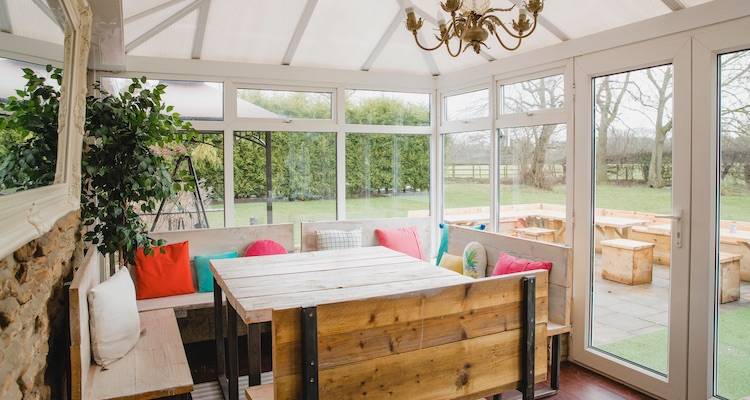
Traditionally, conservatories are a mix of brickwork and glass. The glass panes are similar in size to large windows, and the brickwork usually rises about 1m in height.
On average, a conservatory costs around £15,000 to get.
Pros
- ✔ Quick and Easy to Build
- ✔ Cost-Effective
Cons
- ✖ Not considered a liveable space, so do not add as much value as an extension
- ✖ Can be hot in summer and cold in winter
Summer House Cost
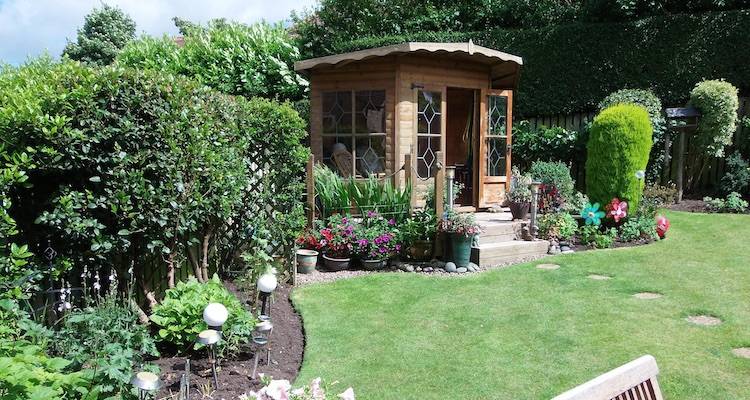
A summer house is a separate building in your garden, which could act as a bedroom or sitting room all throughout the year. The price varies depending on the quality of the construction.
Average summer house prices (including supply and labour) are around £12,000.
Pros
- ✔ Can add as much as 5% to the value of your home
- ✔ Less disruption to home life
Cons
- ✖ Can be expensive to make a liveable space
- ✖ Considered a luxury addition
Orangery Cost
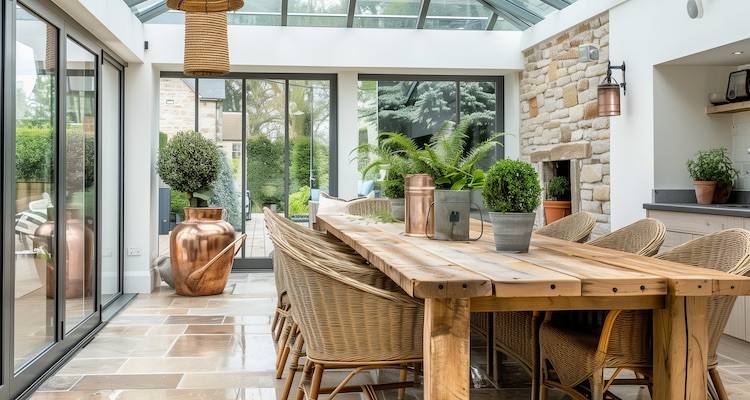
Orangeries are the forebears of conservatories. They are made with more brickwork than a conservatory. The roof of an orangery is usually flat with a glass lantern window.
The average cost of an orangery is £22,000.
Pros
- ✔ Offers more light than an extension
- ✔ Provides more space than a conservatory
Cons
- ✖ Flat roofs can be difficult to maintain
- ✖ Can be more expensive per square meter than other options
Glass Room Cost

Glass rooms are made almost entirely from glass. It is like a conservatory; only the glass continues all the way to the ground; there is no brickwork. The large glass panels create a modern finish.
Average costs for a glass room are between£15,000 and £70,000.
Pros
- ✔ Clear views over your garden and surrounding area
- ✔ Bespoke systems
Cons
- ✖ Expensive to buy and install the glass
- ✖ Expensive to heat
Prefab Extension Cost
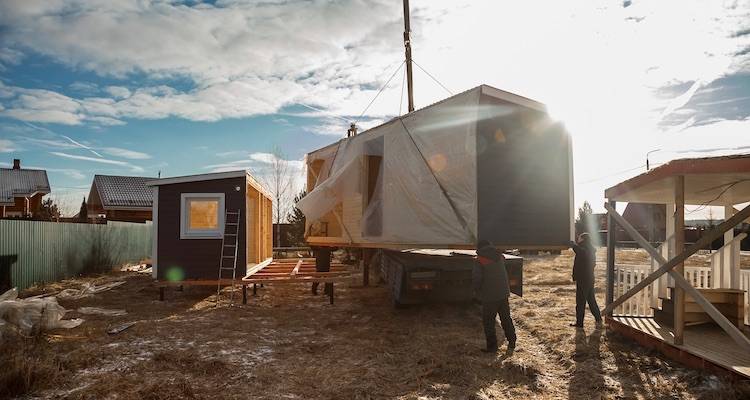
It is possible to create your extension off-site, and then just install it by using cranes to lift the pieces into place.
The average cost for a prefab extension is around £2,000 per m².
Pros
- ✔ Quick and easy installation
- ✔ Minimal disruption for you and your neighbours
Cons
- ✖ Need access space for a large crane
- ✖ Limited options
Loft Conversion Cost
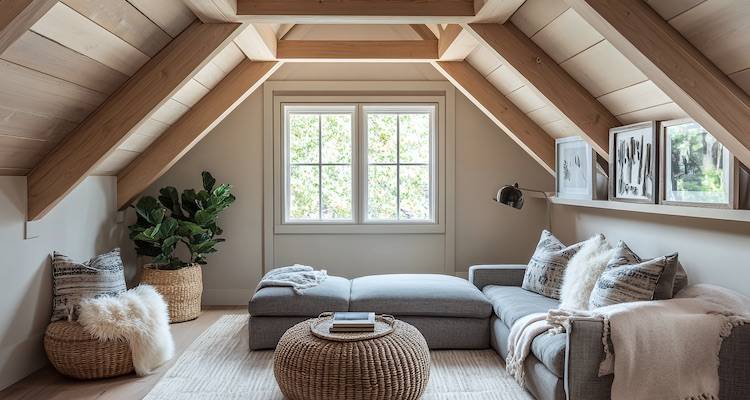
A loft conversion is often the most cost-effective way to add space to your home. The amount of space you gain will depend on your existing loft and the type of conversion you choose.
The average loft conversion costs arounds £40,000, but a basic loft conversion can cost as little as £15,000.
Pros
- ✔ Cheapest cost per m² gained
- ✔ No loss of outdoor space
Cons
- ✖ Available space depends on the style of roof
- ✖ Can be expensive to make more awkward spaces useable
Cost of House Extension Removal
If there is already an extension on your home, but you are not happy with it then you have two options. You can either replace the existing extension, or you can remove it.
Removing an extension can be a big job, depending on the type and how it is integrated into your home. If the roof of the extension is joined to the main house, then you will need the services of a roofer to fix the main roof when you are done.
To remove an extension will cost between £3,000 and £5,000 for a single storey extension. For a double storey extension, the costs can be as much as £10,000.
This will cover the costs of bringing down the old extension and removing the rubble. You will then need to consider what you want to do with the open wall.
Checklist: Hiring House Extension Builders in the UK
When you are hiring contractors to build your home extension, you have a choice to make.
The first option is to choose one contractor to be your project manager, who will be responsible for finding and vetting the rest of the workers on site.
The other option is to act as the project manager yourself. In this case, you will need to consider the credentials of all the workers you hire.
What are the benefits and disadvantages of project managing a house extension? How can I tell whether I should do this or leave it to a professional?
It's more during the finishing stages of your project that you'd want to be more involved and managing things. This is because labour have to work in stages and coordinate with each other to ensure the everything is installed correctly."
Even though you pay a contractor more to run the project, it can work out as a cheaper option. Especially if you don't have experience of running a building project.
Here are some of the key things to look for in a contractor who will also be acting as your project manager.
- Expect to see examples of previously completed work.
- They should be happy to give you details of previous clients so you can speak to them yourself.
- They should be able to give you a breakdown of the costs. Do not expect this on the day. To give an accurate quote will take time.
- A good indicator is that they take notes on the project as you are talking, or just after.
- Check that they will take responsibility for arranging the building control visits.
- Membership in a traded association is not a guarantee of quality, but it is a good indicator that they take pride in their work.
FAQs
Do I need an architect for a house extension?
It can also be advisable for any extension project. Having an architect draw up plans can help to keep costs down and makes sure that there is a clearly agreed on the final product.
How much value does an extension add to my house?
In London, this can be higher, at nearer £4,000 per m². In most cases, the value-added will be greater than the extension costs per square meter.
Can I get a bungalow extension?
How close to the property boundary can I build an extension?
For a double storey extension, you must maintain the sightlines for your neighbour’s property.
How long does it take to get planning permission for an extension?
Sources
https://www.planningportal.co.uk/permission/common-projects/extensions/planning-permission
https://www.leaders.co.uk/advice/how-much-value-does-summerhouse-or-garden-building-add
https://www.dssquared.co.uk/blog/remodelling-interior-vs-adding-an-extension
https://aspireoutdoorleisure.co.uk/2024/03/19/why-choose-modular-extensions-for-your-home-a-quick-and-efficient-solution/
https://www.roofbase.com/news/12-house-extension-types-explained/



